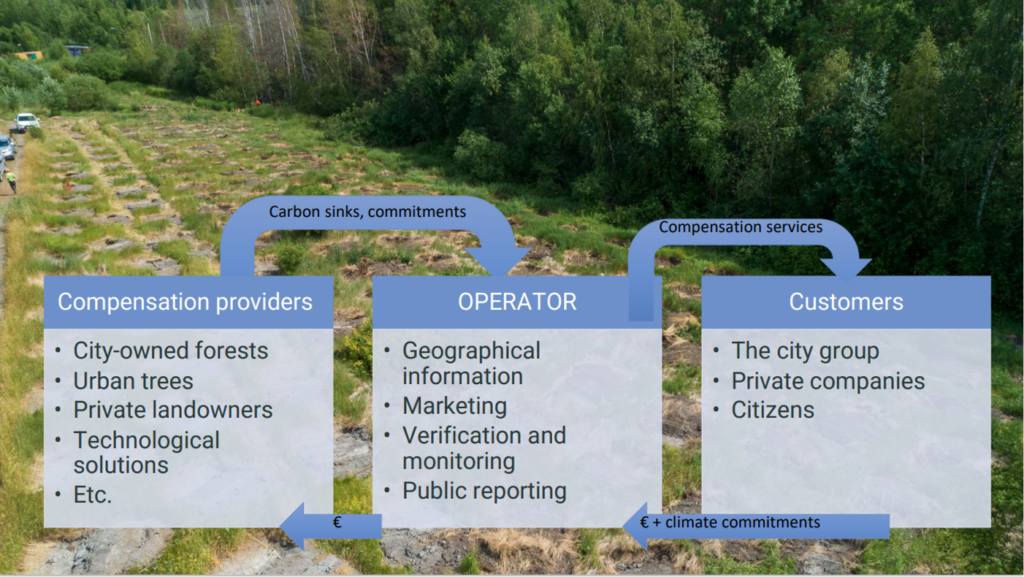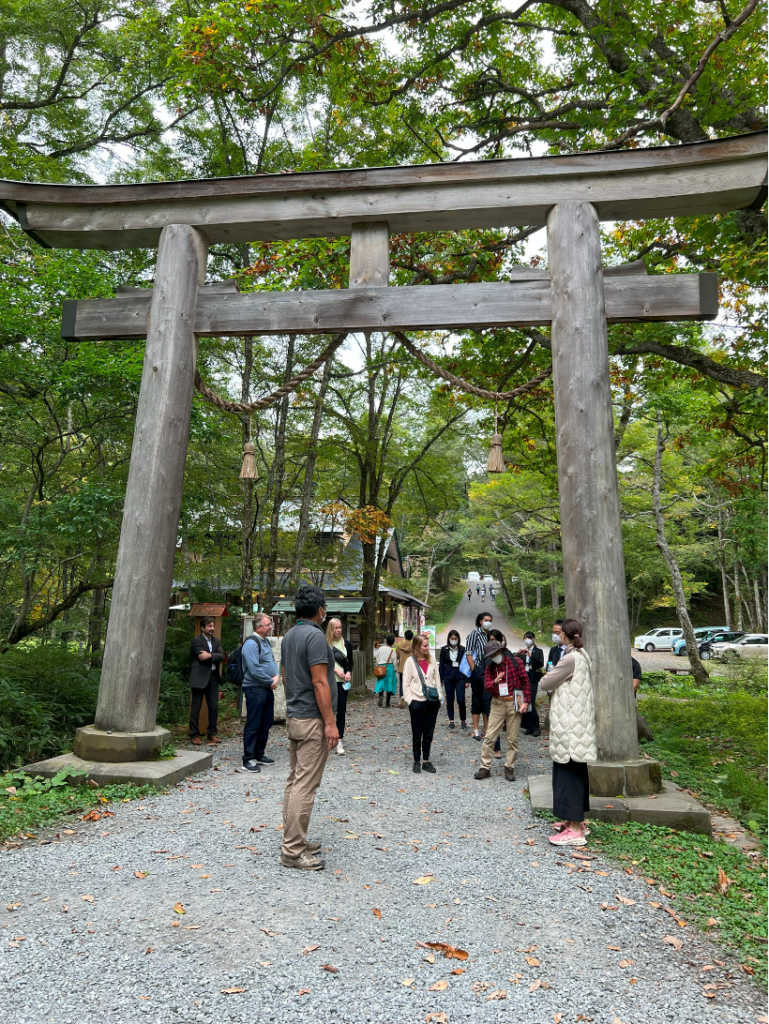14 September 2023
Since the first phase of IURC (2019), Turku City, Finland, and Nagano City and Obuse Town in Japan, cooperated for “Integration of urban-rural circular economy in water-food-energy nexus.” Turku and Nagano shared a common interest in climate change action and renewable energies, in particular biomass. Obuse, a small town surrounded by countryside, is interested in sustainable tourism and urban development harmonious with its natural environment, history and culture. For exchange visit, Nagano and Obuse visited to Turku and Turku visited Nagano and Obuse in November 2019 and October 2022, respectively. Through the visits and online meetings, they learned about each other’s good practices. Nagano and Obuse were inspired by Turku’s ambitious roadmap towards carbon neutrality. Turku was made aware of the real damage caused by the flood of Chikuma River, which took place in 2019 and the remedial and preventive actions undertaken thereafter in Nagano and Obuse.

This workshop was held to look back on the four-year history of exchange between Turku and Nagano and Obuse, and share the knowledge and wisdom gained with citizens, and exchange ideas about the city-to-city international cooperation between Finland and Japan for the future. In addition to the staff from the three city/town halls, about thirty people from businesses, universities, a junior high school participated the meeting.
The meeting was moderated by Mr. Toru Omiya from Obuse Town. First, Hidefumi Imura of IURC Japan Helpdesk gave a brief history of the cooperation between the three parties. Iris Kuriikula from Turku City then described the significance of this cooperation from the perspective of Turku. She reported that Turku is working towards a GHG emission reduction of at least 90% by 2029 from the level of 1990 and that the emissions in the Turku region had already achieved a 56% reduction in 2022. The ways of achieving carbon neutrality in Turku includes a number of initiatives. One of them is the local compensation model for forests between compensation providers, operators, and customers.

Turku also promotes “1.5-degree lifestyle” with special emphasis on the role of young people. The 1.5 degree life video competition for young people was organized in Turku for 2020-2021. A similar video competition was also conducted in Nagano targeting high school students and the winning entries were awarded by the mayor of Nagano. Iris Kuriikula described the Turku’s ambition as one of the best climate cities in the world in view of the benefits of climate efforts to residents.

Following Iris Kuriikula, Yutaro Arai of Nagano City presented the environmental policy of Nagano, focusing on the new industry creation utilizing its rich biomass resources. First, he acknowledged that Nagano was very much inspired and encouraged by the Turku’s ambitious climate policy initiatives in promoting similar actions in Nagano. In 2022, the Nagano region, including Nagano City, Obuse Town and other seven municipalities, jointly published the Goal of Zero Carbon in 2050. In the same year, Nagano City also published its Climate Change Adaptation Plan and it was incorporated in the Basic Environmental Plan of the city. He also stated that the Turku’s carbon-neutral energy system demonstrated by Turku Energia, an energy company owned by the city, provided a lot of hints for Nagano to establish Nagano Smart Power Company Ltd, run by the city and the private sector, in June 2023. Yutaro Arai also presented the concept of the Nagano Biomass Industrial City and its approach for implementation. By promoting the Biomass Industrial City, Nagano aims to achieve multiple objectives including: (i) Building of a decarbonized society and prevention of the global warming, (ii) Establishment of a circular system of forestry management, biomass production, power generation, and waste reduction, (iii) Creation of jobs, and (iv) Conservation of forests and regeneration of mountainous areas which are suffering from depopulation and economic decline.

Toru Omiya, from Obuse Town, described the impact of the exchange with Turku on Obuse’s urban policies. The focus of Obuse’s urban development and environmental policy was exclusively on landscape policy, which was very successful in terms of tourism promotion. The 2011 Great East Japan Earthquake created momentum for the introduction of natural energy in Obuse, and a small hydroelectric power station was installed in 2018. However, the town’s policy on climate change was not clear, with no department in charge and no emission reduction targets being considered. The exchange with Turku, which began in 2019, brought about a significant impact on this situation. Like Nagano City, Turku’s ambitious climate policy was a major stimulus for Obuse Town. In the year they started the cooperation, the torrential rains and resulting flooding of the Chikuma River caused by a typhoon brought about extensive damage in Obuse and provided a major opportunity for the town to address climate change issues. Moreover, Obuse’s lessons from Turku go beyond high targets and implementation measures for climate change action. inspired by the way Turku recruits and utilises climate change experts, Obuse has also introduced a system of flexible employment and utilisation of human resources.
Obuse is a small town of 11 000 inhabitants, but this is one of its strengths. Because of its proximity to the residents, it is easy for the town hall to communicate and work together with them. Moreover, it is easier for a small town to take on the challenge to experiment a small project to create a ‘small circularity of resource flows”. One visible outcome was that Obuse won a grant from the competitive funding from the Japanese Government for climate change measures and began promoting the installation of photovoltaic and storage battery systems in public facilities.


After the three presentations, there were Q&A followed by discussions in breakout rooms. A participant from Nagano asked about energy-saving measures in Turku with respect to heat demand in winter. Then there were questions and answers about the climate conditions in Japan and Finland and their implications for their climate policies. Participants from both sides unanimously pointed out the need of exchanges not only between city halls but also between citizens.
For engagement of civil society in city-to-city cooperation, Iris Kuriikula reported that her team of Turku City was awarded to a grant provided by the Scandinavian-Japan Sasakawa Foundation for enriching friendly relation between the Nordic countries and Japan. The grant will be used to promote exchange between the peoples of Finland and Japan to increase understanding. Turku team has already selected three university students in Turku and they will visit Nagano hoping to communicate with students there. A junior high school teacher from Obuse expressed his hope that opportunities will be developed for engaging junior high school boys and girls and for their studies about international cooperation.
The participants were divided in groups and continued to explore ideas to develop partnership between Turku and Nagano-Obuse. The summary of their views and opinions were reported to the plenary session, summarized below:
- The exchange with Turku since 2019 was an excellent opportunity for Nagano and Obuse to open up new perspectives of climate policies. It is true especially for the small town of Obuse. It was thanks to this exchange that Obuse started concrete initiatives for climate change actions.
- The exchange with Nagano and Obuse was also beneficial for Turku. The visit to the site of the flood damage on the Chikuma River was very useful to know the scale of damage and measures to be taken. There was much to be enlightened by Japanese forest management, which is connected with respect for and belief in nature. People from Turku were also impressed by the promotion of urban development and sustainable tourism in harmony with the unique Japanese natural environment in Obuse, where the ukiyo-e artist Katsushika Hokusai spent the last years of his life.
- It should also be noted that Nagano City and Obuse Town, which are neighbours but have not always worked together, used this exchange as an opportunity for close collaboration. It was highly significant that the Goal of Zero Carbon 2050 was adopted by nine cities and towns including Nagano City and Obuse Town.
- In the future, we would like to develop exchanges not only between city halls, but also with the participation of a wide range of people. Today, we were joined by a teacher from a junior high school in Obuse. We hope that this will be useful for the students to understand the significance of international exchange in schools and universities.